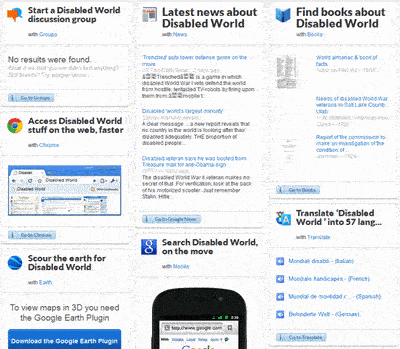What Do You Love (WDYL) - New Search Page from Google
Ian C. Langtree - Writer/Editor for Disabled World (DW)
Published: 2011/07/01 - Updated: 2016/03/27
Category Topic: Website Accessibility - Academic Publications
Page Content: Synopsis - Introduction - Main
Synopsis: New search site What Do You Love (WDYL) provides a reference desk of information from Google services on the same page.
Introduction
New search site What Do You Love (WDYL) provides a reference desk of information from Google services on the same page.
Main Content
A new Google interface, called WDYL (What Do You Love) brings together previews of various specialized Google searches in one place by integrating products and increasing visibility for some of the less-known Google services.
All you need do is visit www.wdyl.com, type the term you are seeking into the search box, and press the blue heart button - the example link shows a search for the "Disabled World" website
The search results will showcase results and options from various Google services, such as sketch-ups, Google Images, Search results, Google trends, Google Books etc. In fact searched info is provided from 20 different Google products on one page. Beyond providing a preview of what you'll find, each segment of the WDYL interface gives you a link to the service itself. The overall layout of the page makes it easier for the user to browse the requested information.
The new website popped up online with no fanfare, marketing or introduction by Google, but was reported first by TechCrunch, which posted a story after being tipped to the site's launch.
This new method of search by Google may be of particular benefit to persons with disabilities, seniors with limited Internet experience, people with cognitive or learning disabilities, and younger children. In the past finding various services from Google was often a frustrating experience, and many surfers did not realize some of the search tools available even existed.
"This is an experiment we've been playing with, and we hope users will play with it too and let us know what they think." - Google.

Google Inc. is a multinational Internet search technologies corporation. Google hosts and develops numerous Internet-based services and products, and generates profit primarily from advertising. The company was founded by Larry Page and Sergey Brin, while they were Ph.D. candidates at Stanford University. Google went public in August of 2004, after being a private company since September of 1998.
Google currently operates over one million servers in data centers all around the world, and processes over one billion search requests and about twenty-four pedabyte of user-generated data every single day.
From the beginning, Google's motto was, "to organize the world's information and make it universally accessible and useful".
What Do You Love is a nice way to remind people just how many things Google does and how many cool services the company offers.
NOTE: it seems "What Do You Love" is also accessible via www.google.com/whatdoyoulove/
 Author Credentials: Ian is the founder and Editor-in-Chief of Disabled World, a leading resource for news and information on disability issues. With a global perspective shaped by years of travel and lived experience, Ian is a committed proponent of the Social Model of Disability-a transformative framework developed by disabled activists in the 1970s that emphasizes dismantling societal barriers rather than focusing solely on individual impairments. His work reflects a deep commitment to disability rights, accessibility, and social inclusion. To learn more about Ian's background, expertise, and accomplishments, visit his full biography.
Author Credentials: Ian is the founder and Editor-in-Chief of Disabled World, a leading resource for news and information on disability issues. With a global perspective shaped by years of travel and lived experience, Ian is a committed proponent of the Social Model of Disability-a transformative framework developed by disabled activists in the 1970s that emphasizes dismantling societal barriers rather than focusing solely on individual impairments. His work reflects a deep commitment to disability rights, accessibility, and social inclusion. To learn more about Ian's background, expertise, and accomplishments, visit his full biography.